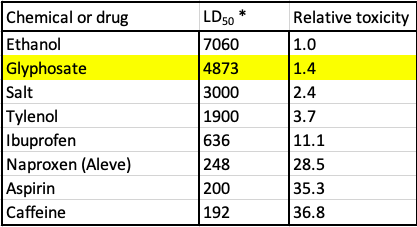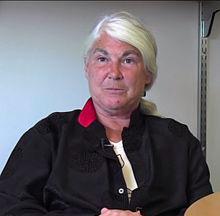When I saw that Dr. Stephanie Seneff, a seriously flipped out professor at MIT, wrote an article entitled Connecting the Dots: Glyphosate and COVID-19 I knew this was going to be fun. And the fact the article was on a blog page hosted by Jennifer Margulis, an alternative medicine aficionado, who hates chemicals because they're not natural, made me drool (a little more than usual). After all, I had some fun with Senneff in 2017 when she claimed that half of the American children will be autistic by 2025 because of glyphosate. Right, and I'm Wilma Flintstone.
An anti-glyphosate article by Seneff is about a surprising as a cockroach in a Manhattan restaurant. But this one is special. Seneff performs a series of exorcism-like "logical" gyrations to support her claim that the COVID pandemic is a result of...glyphosphate. I s##t you not.
Before we get started, let's examine why Dr. Seneff is uniquely unqualified to be writing about medicine, chemistry, or toxicology. She is not an M.D.; far from it. Senneff's advanced degrees include M.S. and E.E. degrees in Electrical Engineering, and Ph.D. in Electrical Engineering and Computer Science. Her position is Senior Research Scientist at the Computer Science and Artificial Intelligence Laboratory at MIT, which can only lead me to conclude that I should have an electrician remove my gallbladder.
"Connecting the Dots: Glyphosate and COVID-19" is a 5925-word masterpiece consisting of embarrassingly terrible science, paranoid conspiracy theories, and some really good yuks. Let's get started with Margulis' introduction:
"Are glyphosate and COVID-19 connected"
Yes, they are. They both contain the letter "O."
"Glyphosate, one of the most toxic chemicals in the world..." (Margulis)
This is just a teensy bit inaccurate. Glyphosate is one of the least toxic chemicals you'll ever come across. I'll even supply some data, you know, that stuff that scientists are supposed to use to use to draw conclusions, to back this up (Table 1).

Table 1. Relative oral acute toxicity of some common substances in rats. Source: US National Library of Medicine (NIH). *The LD50 (in milligrams of the chemical per weight of the animal in kilograms) is the single dose of the substance that will kill 50% of the rats when administered orally. The lower the LD50 the more toxic the chemical. Glyphosate, which can be found right near the top of the table (the safest chemicals), is a bit more toxic than ethanol (alcohol) and a little less so than salt.
So much for that claim. All the remaining quotes come from Seneff.
SS: "My research strongly suggests that glyphosate (the active ingredient in the weed killer Roundup) is a primary cause of the autism epidemic in the United States."
Well, this is a bit odd because in 2012 Seneff wrote:
"Our results provide strong evidence supporting a link between autism and the aluminum in vaccines"
So, what really causes autism? Is it glyphosate? Vaccines? Pop-Tarts?
(Now we begin to enter Crazyville)
SS: "When the COVID-19 pandemic began its march across the world, I started to consider whether glyphosate might play a role."
No way. It's the Pop-Tarts. I have evidence. At least one person who died from COVID ate a Pop-Tart.
SS: "Corona viruses [sic] are the cause of the common cold"
Well, that's not exactly true. Harvard Medical School seems to disagree: "The virus family that causes the most colds is called rhinovirus."
SS: Robert and Elizabeth Mar were a couple who lived in Seattle... tragically, they both succumbed to COVID-19 and died within two days of each other... but perhaps a more significant factor was the fact that [the restaurant [they owned] was located just a few blocks from Interstate 5, an 8-lane highway where trucks, buses, and cars passed by all day long, spewing out toxic exhaust fumes.
I could be wrong, but:
- Both of the victims were in their 70s. There is no question that age is one of the primary risk factors in death from COVID.
- The Mars are probably not the only people in the world who lived or worked near a highway.
- It is probably not difficult to find two people living near a highway that didn't die from coronavirus...
- ...as well as two people who died from the infection who lived nowhere near a highway.
- No matter what did or did not happen to them, there is not one single conclusion that can be drawn from one story about one couple.
So, what does this have to do with glyphosate? (prepare yourself)
SS: "My hypothesis is that the biofuel industry is inadvertently introducing glyphosate into fuels that power our cars, trucks, buses, airplanes, and ships"
Her hypothesis is not accompanied by one single piece of data. None. Just speculation.
My own hypothesis is that I'll be spending New Year's Eve in a hot tub with a zebra. I have no data either, however, my hypothesis is more likely to be true.

SS: "Carbon emissions have become a focal issue in the fight to reverse climate change. One promising approach has been to convert waste biomass into oil-based fuels to augment diesel fuel...waste vegetable oils, such as olive oil...woody biomass..and the stalks of corn and wheat post-harvest into biodiesel fuel...All of these sources can be expected to be contaminated with glyphosate."
Once again, no data. No measurement of any fuel, no nothing. Pure speculation. How much biofuel is used in the US? Has anyone ever measured the amount glyphosate in the biofuel that may or may not be used? Just a crazy assumption.
SS: "In high doses, it is clear that glyphosate has a profound damaging effect on the lungs, even when taken orally. We know that a farmer who tried to commit suicide by drinking a cup of a glyphosate-containing herbicide formulation..."
A couple of problems here.
- Please tell me what intentionally drinking a glass of the stuff has to do with minuscule (if any - we don't know) amount that may or may be found in biofuels that may or may not be used in unknown quantities.
- Note the term glyphosate-containing herbicide formulation. There are a number of surfactants (1) that are mixed with glyphosate that turn it into Roundup. Was it the surfactant or the glyphosate that failed to kill the farmer?
(It gets worse... e-cigarettes)
SS: "[A] newly emergent disease has been given the name, E-cigarette, or Vaping, Product Use-Associated Lung Injury (EVALI)... The symptoms of COVID-19 are remarkably similar to the symptoms of EVALI."
Do you see where this is going?
SS: "Propylene glycol and glycerol are important additives in e-cigarettes. These are often sourced from waste from the biodiesel manufacturing process."
Aha! So, people are getting sick from e-cigarettes because there might be a molecule of non-toxic glyphosate in the propylene glycol and glycerol (nicotine carriers) in the device because the two chemicals might come from biomass.
SS: Furthermore, vitamin E acetate is sometimes used as a thickening agent in e-cigarette production, and it has been identified as a candidate source of the lung problems associated with vaping, although no biological mechanism has been offered
Actually, that's wrong. I offered one (based on chemistry) and it turned out to be correct. But, why is she picking on vitamin E acetate? The same twisted reasoning...
What scientists are missing is that vitamin E is commonly sourced from soybean oil, probably from GMO “Roundup-ready” soybeans... And the biodiesel fuel industry relies on the debris on GMO roundup-ready corn fields...sprayed with glyphosate just before the harvest. Since vaping involves heat, vapors are released that likely contain vaporized glyphosate, which is then breathed into the lungs and directly impacts the lung tissues.
Yep, it's the (non-existent) glyphosate in the vitamin E acetate (which, by the way, people added to solubilize CBD oil and THC for the purposes of vaping) is making the e-cig deadly. This is one of the dumbest things I've ever read.
I'll spare you details about the rest of Seneff's imaginary glyphosate-related maladies, but she tries to implicate a chemical that is less toxic than salt in fatty liver disease, dysfunction of the biome, and persistent rectal itch (OK, I made that one up).
I'm gonna go out on a limb with a few predictions...
- If I'm the parent of a high school graduate hunting for colleges and happen to step into one of Seneff's classes the $76,150 that MIT now costs isn't going to look like a screaming bargain.
- She probably doesn't like me very much, which is going to make for an awkward situation if we run into each other at a Monsanto/Bayer stockholder meeting. But this is unlikely.
- MIT professors earn on average $185,900. ACSH could afford two scientists who actually know what they're talking about for that.
Life ain't fair.
NOTE:
(1) Surfactants are emulsifying agents used to evenly mix insoluble chemicals. This is a bit of an oversimplification.




